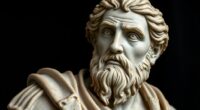Helvidius Priscus was a Roman senator who exemplified unwavering moral courage and Stoic virtues. Despite humble beginnings, he rose through integrity, standing firm against imperial excesses from Nero and Vespasian. His leadership was rooted in honesty, justice, and inner strength, inspiring others to prioritize virtue over personal safety. By practicing reflection and embodying his principles daily, Helvidius shows that true courage comes from staying true to one’s morals, even in danger. Continue exploring to discover more about his inspiring legacy.
Key Takeaways
- Helvidius Priscus was a Stoic senator known for his moral courage and unwavering commitment to truth amid imperial tyranny.
- He boldly opposed Nero’s excesses and Vespasian’s authority, exemplifying moral resilience and integrity.
- Priscus’s leadership demonstrated that true strength lies in standing firm for justice and ethical principles.
- His legacy emphasizes the importance of personal virtue, courageous action, and ethical resistance in political life.
- Through reflection and active virtue practice, he embodied Stoic ideals of inner strength and moral courage.
Helvidius Priscus’s Early Life and Rise to Prominence
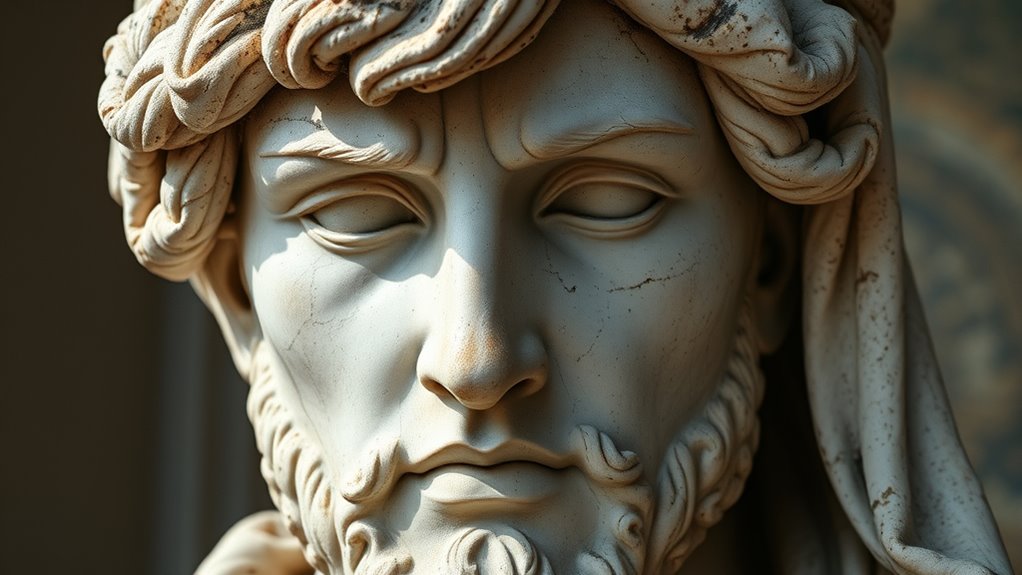
Helvidius Priscus was born into a low Plebeian family in 1st-century Rome, a background that made his rise to prominence all the more remarkable. As a young man, he engaged actively in philosophy debates, demonstrating sharp wit and moral clarity. Through strategic political alliances, he gained respect among Rome’s elite, despite his humble roots. His dedication to Stoic principles guided his public service and strengthened his resolve against corruption. Helvidius’s reputation grew as someone who prioritized truth and virtue over personal gain, setting the stage for his later courageous stand against tyranny. His early life reflects a steadfast commitment to justice and philosophical integrity while understanding the importance of city dynamics for effective governance. Recognizing the influence of social hierarchies in Roman politics, Helvidius navigated these complexities with integrity and resilience. Additionally, his ability to adapt to shifting political landscapes demonstrated his resilience and strategic acumen in turbulent times. His unwavering adherence to moral principles served as a guiding compass throughout his career, reinforcing his reputation as a principled leader. Moreover, his understanding of power structures enabled him to effectively challenge corruption and advocate for justice in a tumultuous political environment.
The Influence of Stoicism on Helvidius’s Values

Stoicism deeply shaped Helvidius Priscus’s core values, guiding his approach to justice, virtue, and public duty. The Stoic virtues—wisdom, courage, justice, and temperance—formed the foundation of his character. These principles fostered his moral resilience, allowing him to stand firm against tyranny and injustice. Helvidius believed that true strength comes from inner virtue and unwavering commitment to truth. Incorporating mindful living into his philosophy, he exemplified the importance of maintaining integrity amidst chaos. His actions reflect a deep alignment with Stoic ideals, emphasizing that moral resilience and integrity are essential in the face of adversity. Through his life, he exemplified how Stoicism elevates personal virtue and reinforces the importance of serving the greater good. Recognizing the significance of emotional regulation, he maintained composure even in stressful situations, embodying the Stoic ideal of inner stability. Additionally, his practice of self-control helped him resist temptations that could compromise his moral principles. Such discipline underscores the role of mental discipline in upholding Stoic virtues and enduring hardships with dignity. Furthermore, his unwavering commitment to virtue ethics demonstrated how moral clarity can guide complex decisions during turbulent times.

Despite the overwhelming power of the Roman emperors, Helvidius Priscus boldly challenged their authority by refusing to show blind obedience. He resisted imperial tyranny, openly criticizing Nero’s excesses and Vespasian’s authority when he deemed it unjust. His unwavering stance exemplifies leadership skills that promote integrity and moral courage. His political resilience shone through his willingness to speak truth, even at great personal risk. Helvidius refused to hide his dissent, demonstrating that moral courage can confront unchecked power. His actions inspired others to stand firm against tyranny, embodying the Stoic ideal that true strength lies in integrity. Recognizing the importance of ethical considerations, Helvidius navigated the perilous political landscape with unwavering principles. You, too, can draw from his example to resist injustice and uphold moral principles amid authority’s dominance.
The Courage to Speak Truth: Helvidius’s Defiant Spirit

Helvidius’s unwavering commitment to truth made him stand out as a symbol of moral courage in the face of imperial power. His courageous speaking defied the fear of death, demonstrating moral resilience. He believed that speaking honestly was his duty, regardless of the risks. Even when threatened, he refused to silence himself or compromise his integrity. Moral courage was at the core of his actions, inspiring others to stand firm against injustice. His actions show that true courage involves confronting tyranny with honesty and resilience, reinforcing the idea that moral integrity must sometimes be voiced loudly, even at great personal cost. Recognizing the importance of ethical hacking, he exemplified how moral courage can extend into safeguarding others and defending justice. In doing so, he embodied the figurative language of standing firm like an unyielding fortress, inspiring future generations to uphold their principles. Additionally, his example highlights the significance of public conscience in challenging wrongful authority and fostering societal integrity. His steadfastness illustrates how risk assessment and moral clarity are vital in facing oppressive regimes and promoting justice.
Lessons of Moral Integrity From Helvidius’S Life
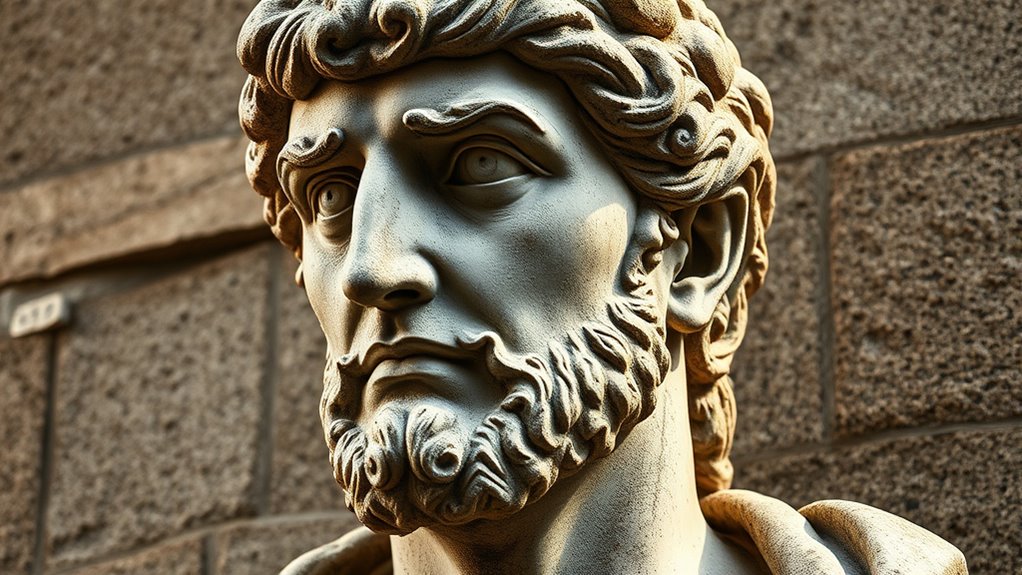
The life of Helvidius offers powerful lessons on moral integrity, showing that standing firm for your principles requires courage and unwavering resolve. You learn that honesty in politics isn’t easy, but it’s essential for true leadership. A commitment to moral integrity often demands sacrifice, as exemplified by Helvidius’s refusal to compromise his personal integrity, even under threat of death. His example teaches you to prioritize truth and virtue over convenience or power. Such steadfastness in the face of adversity underscores the importance of ethical principles in leadership. Throughout his career, Helvidius demonstrated how maintaining personal conviction can serve as a guiding light amid political turmoil and personal danger. Recognizing the importance of moral resilience can inspire contemporary leaders to uphold their values in challenging circumstances.
The Legacy of Helvidius in Modern Leadership and Virtue
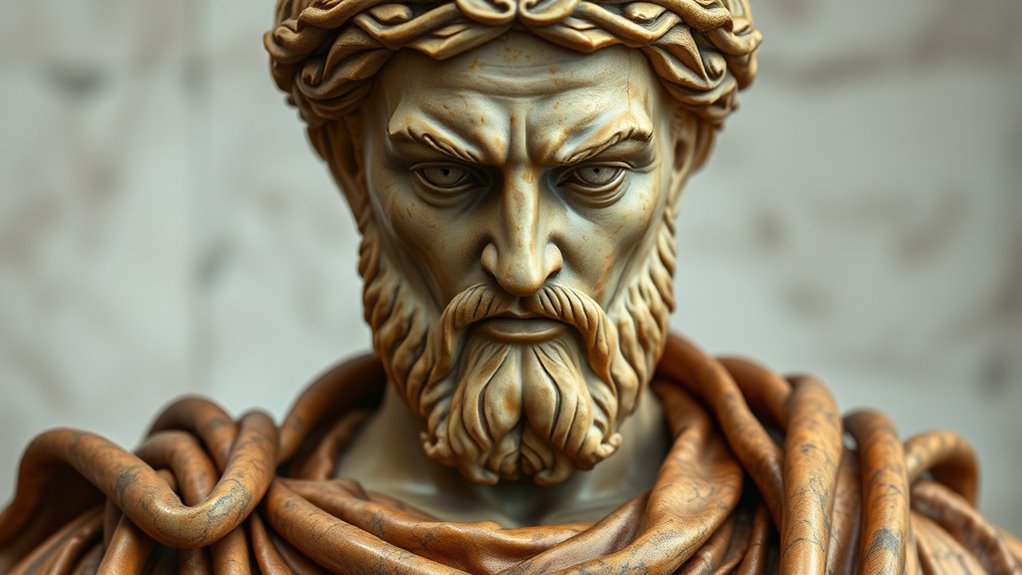
Helvidius’s unwavering commitment to truth and moral integrity continues to influence modern leaders and advocates of virtue. His example highlights the importance of ethical leadership, demonstrating how staying true to core principles fosters trust and respect.
Helvidius’s moral resilience teaches us to stand firm against pressure and injustice, even when risks are high. Today, his legacy reminds leaders to prioritize integrity over convenience, to speak out against corruption, and to lead with courage.
Emulating Helvidius: Applying Stoic Principles Today
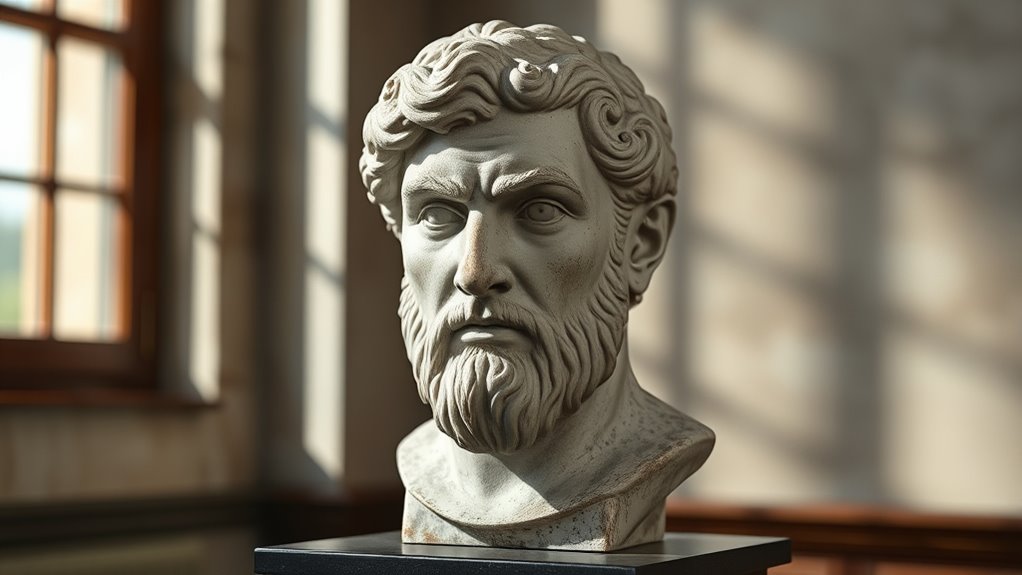
Though challenging, applying Stoic principles like courage, integrity, and self-control can help you navigate today’s complex world. Start with meditative reflection to clarify your values and strengthen your resolve.
Applying Stoic virtues like courage and integrity helps navigate today’s complex world with resilience and clarity.
Emulate Helvidius by practicing virtues in action—speaking truth despite opposition, standing firm against injustice, and remaining anchored in your principles.
Cultivate resilience through daily reflection on virtuous choices, reinforcing your moral courage. By embodying these principles, you align with Stoic teachings and develop inner strength.
Ultimately, living with integrity and practicing virtues in action empowers you to face adversity bravely, just as Helvidius demonstrated in his steadfast pursuit of truth and justice.
Frequently Asked Questions
How Did Helvidius’S Low Social Background Influence His Philosophical and Political Journey?
You might wonder how someone from a low social background can succeed in politics and philosophy. Helvidius’s story shows that social mobility is possible through personal resilience and steadfastness.
His humble origins didn’t hold him back; instead, they fueled his determination to serve and stand for what’s right. His journey proves that with resilience, you can overcome societal barriers and make a meaningful impact, regardless of your starting point.
What Specific Stoic Practices Did Helvidius Employ to Maintain His Moral Courage?
Did you know that only 8% of people regularly practice daily reflection? Helvidius used this Stoic practice to bolster his moral resilience, helping him stay firm in his principles.
He constantly reminded himself of his duties and virtues, staying true to his beliefs despite threats. By cultivating inner strength and practicing daily reflection, he maintained his moral courage, embodying Stoic resilience even in the face of tyranny.
How Did Helvidius’S Relationships With Other Stoics Shape His Actions?
You see, your relationships with other Stoics like Thrasea and Fannia deeply shape your commitment to personal integrity and public service.
Their shared values reinforce your resolve to stand firm against injustice, inspiring you to act with moral courage. These bonds create a support system that encourages you to prioritize virtue over fear, helping you stay true to Stoic principles even when facing political opposition or personal risk.
In What Ways Did Helvidius’S Defiance Impact Roman Political Culture?
Imagine a ship’s captain steering through stormy seas, refusing to veer from the true course. Your question about Helvidius’s defiance shows how his senatoriaal resistance became a beacon for civic integrity, inspiring others to stand firm against tyranny.
His unwavering stance challenged Roman political culture, encouraging future leaders to prioritize moral courage and truth over mere obedience, shaping a legacy of resilience and principled resistance in governance.
How Can Helvidius’S Example Be Applied in Today’S Political and Social Challenges?
You can apply Helvidius’s example by cultivating moral resilience, standing firm in your values despite opposition. His courage teaches you to speak truth to power and resist unjust authority.
In today’s social and political challenges, embrace civic activism with integrity, just as he did. Let his example remind you that moral courage and unwavering commitment to justice are essential for meaningful change and a healthier, more honest society.
Conclusion
Like a steadfast lighthouse amid turbulent seas, Helvidius Priscus’s unwavering courage shines as a beacon of moral integrity. His example reminds you that true strength lies in standing firm against injustice, guided by your principles. When faced with darkness, let his fearless spirit inspire you to hold your ground and illuminate the path of truth. Embrace these timeless virtues, and you’ll navigate life’s storms with resilience and moral clarity.

